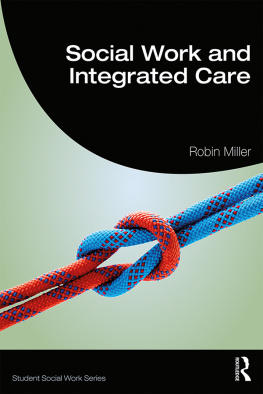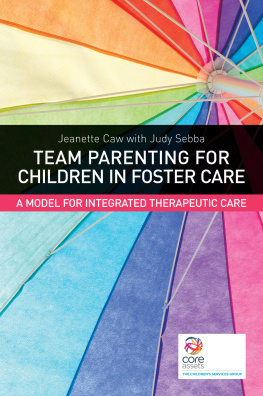Social Work and Integrated Care
Social Work and Integrated Care draws on the latest research, practice and theory to explore integration within both child and adult services. Although all the home nations in the UK view integrated care as a top priority within health and social care policy, many people continue to experience fragmented care. This book sets out the case for integration, considers the evidence of its impact, and discusses the implementation challenges that must be overcome.
Packed full of current examples of integration, from across the UK and internationally, and reflexive exercises which highlight practice issues for social workers, it provides the following key learning outcomes:
- An understanding of what is meant by integrated care and why it is seen as vital to a modern health and social system.
- A knowledge of the expected impacts in relation to improving the experience and outcomes for individuals and their families, addressing inequalities and promoting health and wellbeing and increasing financial efficiency.
- A recognition of the common barriers to integrated care and what such fragmentation can mean for individuals and their families.
- A critical review of key approaches to promote integration and their practical implementation.
- Reflection on the potential contribution of social workers and their own collaborative practice.
Providing a comprehensive and accessible overview of integrated care policies and practice, this book will help prepare social workers for the realities of collaborating with other professions and services. It should be considered essential reading for students undertaking their professional qualification and those who are in practice who are looking to improve their ability to collaborate.
Robin Miller is the Head of the Department of Social Work and Social Care at the University of Birmingham. His research interests focus on new models of integrated care between health and social care. He has previously worked as a social worker, manager and commissioner, and served on boards within housing and charitable sectors. He is the current Joint Editor-in-Chief of the International Journal of Integrated Care and an advisory group member of the European Primary Care Network.
Student Social Work
www.routledge.com/Student-Social-Work/book-series/SSW
This exciting new textbook series is ideal for all students studying to be qualified social workers, whether at undergraduate or masters level. Covering key elements of the social work curriculum, the books are accessible, interactive and thought-provoking.
New titles
Social Work and Social Policy, 2nd ed.
An introduction
Jonathan Dickens
Mental Health Social Work in Context 2nd ed.
Nick Gould
Social Work in a Changing Scotland
Edited by Viviene E. Cree and Mark Smith
Social Theory for Social Work
Ideas and Applications
Christopher Thorpe
Human Growth and Development
An Introduction for Social Workers
2nd Edition
John Sudbery and Andrew Whittaker
Counselling Skills for Social Workers
Hilda Loughran
Social Work and Integrated Care
Robin Miller
First published 2019
by Routledge
2 Park Square, Milton Park, Abingdon, Oxon OX14 4RN
and by Routledge
711 Third Avenue, New York, NY 10017
Routledge is an imprint of the Taylor & Francis Group, an informa business
2019 Robin Miller
The right of Robin Miller to be identified as author of this work has been asserted by him in accordance with sections 77 and 78 of the Copyright, Designs and Patents Act 1988.
All rights reserved. No part of this book may be reprinted or reproduced or utilised in any form or by any electronic, mechanical, or other means, now known or hereafter invented, including photocopying and recording, or in any information storage or retrieval system, without permission in writing from the publishers.
Trademark notice: Product or corporate names may be trademarks or registered trademarks, and are used only for identification and explanation without intent to infringe.
British Library Cataloguing-in-Publication Data
A catalogue record for this book is available from the British Library
Library of Congress Cataloging-in-Publication Data
A catalog record has been requested for this book
ISBN: 978-1-138-48415-3 (hbk)
ISBN: 978-1-138-48416-0 (pbk)
ISBN: 978-1-351-05286-3 (ebk)
As ever, thanks to Vicki for her insights, encouragement and support.
| Integrated care: | what people experience when services work together to ensure that they can plan their care to achieve the outcomes important to them. |
| Integration: | the processes used to bring together professionals, services, organisations and systems in order to provide integrated care. |
| Professional: | an individual who has training and experience to undertake designated roles within health and social care. This includes those who must register with a professional body and those who are highly skilled but may not require such registration. |
| Sector: | the collective name for the bodies that fund, plan and deliver services in response to an identified public need. This includes social care, health, education, criminal justice and housing. |
Social workers know that a good quality of life requires the involvement of many people. This is primarily about the personal networks derived from family, friends, localities and communities of choice that provide emotional and practical support. Social work is about helping people to recognise and draw on the assets within such networks and to contribute in a relationship of reciprocity. For those who do not have strong informal networks, or face challenges of such scale that networks are not sufficient, then formal services can be necessary. These challenges may be related in part to a long-term disability, experiences of abuse or neglect, frailty or a mental health problem but will also have their roots in the multiple and enduring inequalities and discrimination with our societies. In the ideal welfare state, services to help with these challenges would be personalised and flexible so that the support is sufficient to what that person and their network requires to respond to the challenge. This would involve the services and the professionals who work within them being able to work constructively and seamlessly with the other services and professionals involved. All of us would want to provide and indeed receive support in which there are not gaps and uncertainties in what will be delivered and how it will be arranged.
Social workers also know that it is common for people not to receive person-centred and coordinated care. Most social workers will encounter on a daily basis examples of fragmentation between services: child and adolescent mental health services not responding to concerns from schools about the welfare of a pupil, hospital consultants not communicating with general practitioners about discharge arrangements for an older person, community psychiatric nurses not engaging with a housing support provider around a tenants mental health. This leads to distress, frustration and anxiety for people and their families that add to the existing challenges. At its most serious, they can result in someone being left at risk of serious harm and abuse and their difficulties escalating to crisis point. As a social work professional this is also incredibly frustrating with precious time being lost which would be better spent positively engaging with a person and their family. The process of chasing, negotiating and in some cases advocating with other services is often stressful for the social worker concerned. Even more so then for the person whose needs are not being met and whose current and future wellbeing is affected. And sometimes it will be social work itself that can be the source of fragmentation.












![Thomas W. Miller [Thomas W. Miller] - Web and Network Data Science: Modeling Techniques in Predictive Analytics](/uploads/posts/book/119619/thumbs/thomas-w-miller-thomas-w-miller-web-and.jpg)